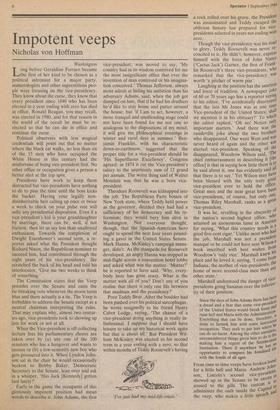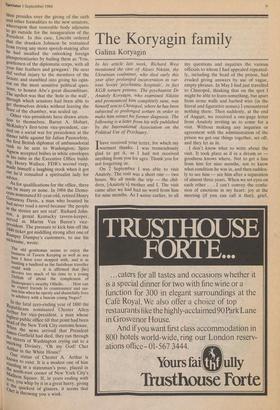Impotent veeps
Nicholas von Hoffman
Washington Long before Geraldine Ferraro became the first of her kind to be chosen as a political astronaut for a major party, numerologists and other superstitious peo- ple were focusing on the vice-presidency. They know about the curse, they know that every president since 1840 who has been elected in a year ending with zero has died in office. Ronald Reagan, you may recall, was elected in 1980, and for that reason in the world of the occult he must be re- elected so that he can die in office and continue the curse.
Political observers with less magical credentials will point out that no matter where the black cat walks, no less than six of the 15 men who have occupied the White House in this century had the misfortune of being vice-president first. No other office or occupation gives a person a better shot at the top spot.
Presidents have work to keep them distracted but vice-presidents have nothing to do to pass the time until the boss kicks the bucket. Having your legally non- disinheritable heir calling up once or twice a week to check on your pulse rate will sully any presidential disposition. Even if a vice-president's kid is your granddaughter by marriage, there can be, well, if not friction, then let us say less than unalloyed enthusiasm. Towards the completion of Dwight Eisenhower's second term, a re- porter asked what the President thought Richard Nixon, the Republican nominee to succeed him, had contributed through the eight years of his vice-presidency. Ike scratched the back of his head and told his interlocutor, 'Give me two weeks to think of something.'
The Constitution states that the Veep presides over the Senate and casts the tie-breaking vote whenever the moon turns blue and there actually is a tie. The Veep is forbidden to address the Senate except as a neutral chairman interpreting the rules. That may explain why, almost two centur- ies ago, vice-presidents took to showing up late for work or not at all.
When the Vice-president is off collecting lecture fees his parliamentary chores are taken over by (a) any one of the 100 senators who has a hangover and wants to snooze or (b) a low-seniority new boy who gets pressured into it. When Lyndon John- son sat in the chair he would occasionally beckon to Bobby Baker, Democratic Secretary to the Senate, lean over and ask in a whisper, 'Has Jack [Kennedy] gotten laid lately?'
Early in the game the occupants of this gloriously impotent position had mean words to describe it. John Adams, the first
vice-president, was moved to say, 'My country had in its wisdom contrived for me the most insignificant office that ever the invention of man contrived or his imagina- tion conceived.' Thomas Jefferson, always more adroit at hiding his ambition than his adversary Adams, said, when the job got dumped on him, that if he had his druthers he'd like to stay home and putter around the house, but 'if I am to act, however, a more tranquil and unoffending stage could not have been found for me nor one so analogous to the dispositions of my mind; it will give me philosophical evenings in winter and rural days in summer.' Ben- jamin Franklin, with his characteristic down-to-earthness, suggested that the proper title for a vice-president should be 'His Supei-fluous Excellency'. Congress agreed; in 1874 it cut the Vice-president's salary to the unprincely sum of 12 grand per annum. The worst thing said of Walter Mondale was that he was a born vice- president.
Theodore Roosevelt was kidnapped into the job. The Republican Party bosses of New York state, where Teddy held power as the governor, decided they had had a sufficiency of his democracy and his re- formism; they would bury him alive in Washington. Not everyone thought, though, that the Spanish-American hero ought to spend the next four years pound- ing a gavel in the United States Senate. Mark Hanna, McKinley's campaign mana- ger, didn't. As the stampede for Roosevelt developed, an angry Hanna was stopped in mid-flight across a convention hotel lobby and asked what was the matter. 'Matter?' he is reported to have said. 'Why, every- body here has gone crazy. What is the matter with all of you? Don't any of you realise that there is only one life between that madman and the presidency?'
Poor Teddy Bear. After the boulder had been pushed over his political sarcophagus, he wrote resignedly to his friend Henry Cabot Lodge, saying, 'The chance of a vice-president doing anything is really in- finitesimal. I suppose that I should have leisure to take up my historical work again but that is about all.' But President Wil- liam McKinley was elected to his second term in a year ending with a zero, so that within months of Teddy Roosevelt's having
'I've just had my mid-life crisis.'
a rock rolled over his grave, the President was assassinated and Teddy escaped the oblivion history has prepared for vice- presidents selected in years not ending with zero.
Though the vice-presidency was his road to glory, Teddy Roosevelt was never re- conciled to it. He didn't, howe,ver, express himself with the force of John Nance ('Cactus Jack') Garner, the first of Frank- lin Roosevelt's three vice-presidents, who remarked that the vice-presidency was worth 'a pitcher of warm piss'. ' Laughing at the position has the sanction and force of tradition. A newspaper joke of 60 or 70 years ago has a reporter saying to his editor, 'I've accidentally discovered that the late Mr Jones was at one time Vice-president of the United States; shall we mention it in his obituary?' To which the editor replied, 'Oh no! Notice onlY important matters.' And there was the vaudeville joke about the two brothers who disappeared. One went West and was never heard of again and the other was elected vice-president. Speaking of the disappeared, Woodrow Wilson said, chief embarrassment in describing it [the office] is that in saying how little there is be said about it, one has evidently said al' that there is to say.' Yet Wilson may have, been blessed with the only truly grea' vice-president ever to hold the office. Great men and the near great have been vice-presidents, of course, but only one' Thomas Riley Marshall, ranks as a great vice-president.. It was he, revelling in the obscurity of the nation's second highest office, wh° attained an anonymous fame in America for saying, 'What this country needs is a good five-cent cigar.' Unlike most who ha° the job, Marshall was not a president manqué or he could not have sent Wilson a book inscribed with best wishes fr°11,1 Woodrow 's 'only vice'. Marshall knew Ins place and he loved it, saying, 'I come fr°,111 Indiana, the mother of vice-presidents, tee home of more second-class men than anY other state.' Marshall understood the danger of vice' presidents going bananas over the inferior' ity of their position: Since the days of John Adams there has been, . a dread and a fear that some vice-presiden; of the United States would break loose an° raise hell and Maria with the Administrationi; Everything that can be done, therefore' 5 done to furnish him with some innocuo:. occupation. They seek to put him where can do no harm. Among the other nameles,"e unremembered things given him to do is !Jill making him a regent of the Smithsonlaan Institution. There if anywhere he has „fe opportunity to compare] his fossilised " with the fossils of all ages. From time to time veeps have broken loos:, for a little hell and Maria. Andrew Inrint, son, Lincoln's second vice-preside in
showed up in the Senate to be sworn to
soused to the gills. The customis .0 administer the oath inside the Capitol h and
the veep, who makes a little speec
then presides over the giving of the oath and other formalities to the new senators, Whereupon that venerable body adjourns to go outside for the inauguration of the President. In this case, Lincoln ordered that the drunken Johnson be restrained from trying any more speech-making after he had insulted the onlooking foreign Plenipotentiaries by hailing them as 'You, gentlemen of the diplomatic corps, with all Your fine feathers and gewgaws'. He next did verbal injury to the members of the Senate and stumbled into giving his opin- ion on the most sensitive political ques- tions, to honest Abe's great discomfiture. The upshot was that the 'hole in the wall', through which senators had been able to get themselves drinks without leaving the floor of the chamber, was sealed up. Other vice-presidents have drawn atten- tion to themselves. Barret A. Hobart, McKinley's first-term vice-president, car- ried on a social war for precedence at the dinner table against Sir Julian Pauncefote, the first British diplomat of ambassadorial rank to be sent to Washington; Spiro Agnew accepted bribes in white envelopes in his suite in the Executive Office build- ing, Henry Wallace, FDR's second veep, made himself a laughing stock when it got
out he'd consulted a spiritualist lady for advice.
As for qualifications for the office, there can be many or none. In 1904 the Demo- crats nominated 81-year-old, retired Henry .Gassaway Davis, a man who boasted he nad never read a novel because 'the people in the stories are not real'. Richard John- scm, a genial Kentucky tavern-keeper, Served as Martin Van Buren's vice- resident. The pressure to kick him off the k840 ticket got middling strong after one of .untPsY Dumpsy's customers, to use his nickname, wrote: The old gentleman seems to 'enjoy the business of Tavern Keeping as well as any host I have ever stopped with, and is as bustling a landlord as the fastidious traveller could wish . . . it is affirmed that [he] devotes too much of his time to a young Delilah of about the complexion of Shakespeare's swarthy Othello. . . . How can
expect friends to countenance and sus- tain him when he openly and shamefully lives Ill adultery with a buxom young Negro?
In the fatal zero-ending year of 1880 the 'ZePublicans nominated Chester Allen c".rthur for vice-president, a man whose Luighest public office till that point had been rd of the New York City customs house. la en the news arrived that President tkuntes Garfield had died, they ran through suitei streets of Washington crying out to a A rking Divinity, 'Oh my God! Chet tyrthur in the White House!' One statue of Chester A. Arthur is ZtanoWn to exist. It is a modest one of him the in a statesman's pose, placed in ;die north-east corner of New York City's zeradison Square. If, in years ending with it :3,, You whip by it in a great hurry, giving Chet quickest of glances, it seems that
et is throwing you a wink.











































 Previous page
Previous page